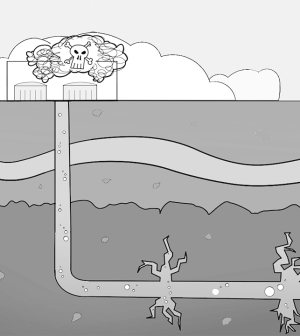- Fresh Beats: Drake does it again and again
- Student movie passes for ‘The Wedding Ringer’ early screening
- Singers and songwriters jam at UPC’s Acoustic Art Series
- New Asian restaurants bring in college crowd
- Fresh Beats: Fall Out Boy and more new music
- New gourmet doughnut shop set for opening
- Fresh Beats: 8/28/14
- Five restaurants Denton needs
- First Friday of the month showcases artists
- A Calcium For Your Funny Bone Web Series – A Q&A w/ Brandon H. Rodriguez
High carcinogen levels detected in Denton park

Dalton LaFerney / Senior Staff Writer
A new study by ShaleTest, a Denton-based nonprofit founded in 2010 that tests air and water near drilling sites throughout the country, found benzene levels exceeding environmental standards near McKenna Park on the corner of Thomas and Scripture Streets.
Exposure to the carcinogen benzene interrupts cell function and prohibits the production of red blood cells. It can alter the human immune system and those exposed may experience dizziness, tremors or confusion. Benzene has also been linked to anemia, leukemia and blood cancer.
The ShaleTest study, Project Playground, found a benzene presence of 6.5 parts per billion during one test in the air at McKenna Park. The maximum allowance for long-term exposure set by the Environmental Protection Agency and the Texas Commission on Environmental Quality is 1.4 parts per billion. Short-term exposure allowance is 180 parts per billion.
For those ShaleTest employees, the study highlights the growing distrust between citizens and the oil and gas industry.
“The oil and gas industry claims that they’re drilling responsibly,” ShaleTest president Tim Ruggiero said. “These tests show they’re not.”
Fixing the problem
The carcinogen is suspected to be coming from a well about 500 feet away from the park. A Youtube video of the site, “Legend Natural Gas Well, Razor Unit Bonnie Brae Rd 2, Denton, TX,” showed chemicals leaking from the well.
The study examined five DFW parks by using infrared video and ambient air sampling.
“Some of the chemicals are produced by other things,” ShaleTest director Calvin Tillman said. “You can clearly see this stuff coming out of the tanks near McKenna Park.”
The Texas Railroad Commission is responsible for the oversight of on-site operations, while the TCEQ handles the emissions in a larger area such as McKenna Park.
Spokesperson for TCEQ, Andrea Morrow, said it investigates emissions when the RRC, law enforcement or residents report concerns. She said information about a possible McKenna Park investigation is unavailable, because the TCEQ does not want the owner of the drilling site to be aware of any inquiry.
Vapor recovery units can be placed on wells to prevent such leaks, but RRC spokesperson Gaye McElwain said there is not a rule requiring use of those units.
“Requests for a vapor recovery unit would need to be directed to the operator of the well,” McElwain said.
Community at risk
According to the EPA, benzene is listed as number six on the 2005 Priority List of Hazardous Substances for the Comprehensive Environmental Response, Compensation and Liability Act.
Benzene is found in gasoline and diesel, making it abundant in areas with heavy vehicle traffic. It is also found in glues, paints, detergents, tobacco smoke and is emitted during forest fires.
Tillman said the carcinogen is present from everyday items, but not to the extent he and his team found in the tests.
A phone operator at the regional CDC health hotline in Dallas said the presence of benzene is concerning, and those in the area should contact their city health department.
Calls to the City of Denton Health Department and Parks and Recreation Department were not returned.
“The big discussion here in Denton is the property rights,” Tillman said. “You should be able to buy a piece of property and use it how you want to as long as you’re not hurting somebody else’s property rights. When you trespass your chemicals onto my property, then you’re hurting my property rights.”
Resident involvement
For many opponents to hydraulic fracturing in Denton, the study does not come as any surprise as the vote on a citywide fracking ban approaches.
“I think it is unacceptable that these things go unnoticed until someone takes it upon themselves to investigate,” documentary filmmaker and graduate student Garrett Graham said. “That’s supposed to be the job of industry regulators, but for those of us living here in Texas, there might as well not be any regulation. That’s why concerned people had to form groups like ShaleTest to monitor the industry themselves. They are providing a public service that our government has failed to deliver.”
Cathy McMullen, president of Denton Drilling Awareness Group, the group behind the “Frack Free Denton” movement, has combated industry and city officials head-on.
“It’s not any easier to communicate with the city now,” she said. “We’ve been told that they can’t really become involved, because it’s an issue for the voters. They had their chance to fix this from 2009 to 2013. It’s out of their hands now, and it’s in the citizens’ hands. What the city says or does doesn’t matter anymore.”
McMullen lives near McKenna Park and is concerned about the nearby leaking chemicals. She said many Denton voters are unsure whether to vote for the fracking ban this November due to possible lawsuits that could occur against the city.
“But when they see children being poisoned, they don’t worry about the lawsuits,” McMullen said. “Since that report came out, we’re seeing a lot more families involved in this.”
She said the anti-fracking movement in Denton is only growing as Election Day nears.
“Every day we are getting requests from people who want to volunteer,” she said. “No matter how this vote comes out, there’s one thing I know for sure: we’ve changed history and we’ve changed the conversation. I think in the future you’re going to see production companies behaving better.”
Featured Illustration by Jake Bowerman – Senior Staff Illustrator









